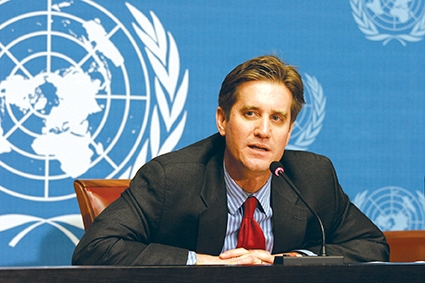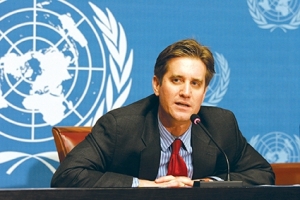Bryza: Russia Will Use Definition of Terrorism to Advance Political Interests
We spoke to former Deputy Assistant Secretary of State for European and Eurasian Affairs, Ambassador Matthew Bryza.
What next for Turkey-Russia relations after the assassination of the Russian diplomat Andrey Karlov in Ankara?
I actually think that Turkey-Russia relations are going to grow stronger because of the horrible tragedy. This particular attack has shaken me personally more than any, because it suggests that not only our ambassadors but our former ambassadors are targets, and that deep inside the Turkish system there are still rogue elements that do horrible things.
A lot of people share that view here in Turkey and would like to see Turkey-Russia relations get stronger. The way both President Erdogan and President Putin have responded suggests that they agree. And they are trying to transform this terrible sorrow into a positive momentum that might generate a new peace process that would involve Russia, Turkey, and Iran, brokered by Kazakhstan.
Russia, Iran and Turkey met in Moscow to work out a political accord to end Syria’s nearly six-year war, leaving the United States on the sidelines. Secretary of State John Kerry was not invited. Nor was the United Nations consulted. Should we expect more involvement from Russia in the region?
Absolutely, if Russia’s aggressive involvement does not involve continued war crimes, as the UN has accused Russia of; if it does not involve specifically targeting children in schools and hospitals that are hidden underground with bunker blasting bombs, but instead pursues an actual political process to resolve the conflict, that’s good.
But the tragedy is that the United States, the UN, and our allies have been absent. We’ve been hearing Secretary John Kerry for months saying there is no military solution to this conflict. Well, there is one and it just happened, at least in Aleppo. And Russia and Bashar Al-Assad won. We should have been more focused on imposing costs on Moscow for these, again in the US’ term “war crimes,” but that’s over now.
I don’t think Russia really cares about terrorism, but, of course, Russia will use the definition of terrorism to advance its own political interests.
Trump has not articulated a comprehensive Syria policy, but he has suggested he will work alongside Russia to fight extremists, including the Islamic State. What are your thoughts on that?
In theory that would be great if Russia and the US could work together to destroy the Islamic State. But I don’t think that’s really ever going to happen. The way the US looks at fighting terrorism and the way Russia does are totally different.
And the tactics we are using are different. When the US and our allies fight terror, an effort is made to limit the killing of innocents. When Russia conducts anti-terrorist actions like in Aleppo or in Grozny, they kill everybody. I don’t think Russia can emerge in that way. But what we will see in Syria, even once the ISIS is defeated, will be successor groups and Bashar Al-Assad still in power. And Syria led by Assad cannot be stabilized.
Even if US and Russia partner up, in a relatively short time we’ll see Donald Trump deeply disappointed and we’ll see him giving up on his Russia reset policy the same way Barak Obama did.
Critics say Obama’s reluctance to back the Syrian opposition with more involvement leaves Washington with little leverage on a geopolitical crisis as President-elect Donald J. Trump prepares to take office. Where does that put the US in regional politics?
I think it puts the US on the sidelines for now. In my opinion, President Obama’s huge diplomatic failure was not enforcing his own red-line with regards to use of chemical weapons by Bashar Al-Assad, and I think Barak Obama and John Kerry were terribly manipulated by Sergey Lavrov, who somehow convinced Kerry that eliminating chemical weapons was to reduce human suffering in Syria and we know that it’s absolutely not what happened.
So, the US has played itself out of the game.
How do you see this geo-political crisis affecting US-Russia relations under the new White House administration?
I think there will be a window of vulnerability when the President tries to take advantage of what he views as Donald Trump’s naiveté in calling another Russia reset policy. If we can get through that without escalation or tension between Moscow and Washington to a dangerous level, then I think Donald Trump will wake up and maybe pursue a policy that should have been in place a long time ago: to impose real costs for the sorts of behavior carried out by Russia in murdering innocent civilians in Aleppo.
Russia and Turkey are both regional powers. What implications can their new phase of RELATIONS have for Georgia and the South Caucasus?
I don’t expect a direct influence on Georgia. My fear is that Russia has been working on the energy side, to re-isolate Georgia and Azerbaijan. I think the Turkish stream pipeline project is aimed at discouraging companies from investing in Azerbaijan’s gas resources, because there will be so much Russian gas in the Turkish stream heading to the EU space.
I think that’s part of the Russia strategy to pull Azerbaijan and Georgia more and more under Russian control, with the EU divided and not paying attention and then Turkey eager to rebuild relations with Russia, there is a danger that Azerbaijan and Georgia could begin to lose ties with Turkey and the EU. I hope it doesn’t happen. In Georgia, events are defining their own political momentum since the last elections. Moscow is taking advantage of the election results and will continue to do so; it has allies within the Georgian system. I just hope that the Georgian people will remain the Georgian people and will maintain their focus on their own aspirations for the closest possible ties with the trans-Atlantic community. And I am confident that will continue even though there will be attempts from Moscow to destroy that national consensus.
Nana Sajaia, Voice of America Georgian Service












